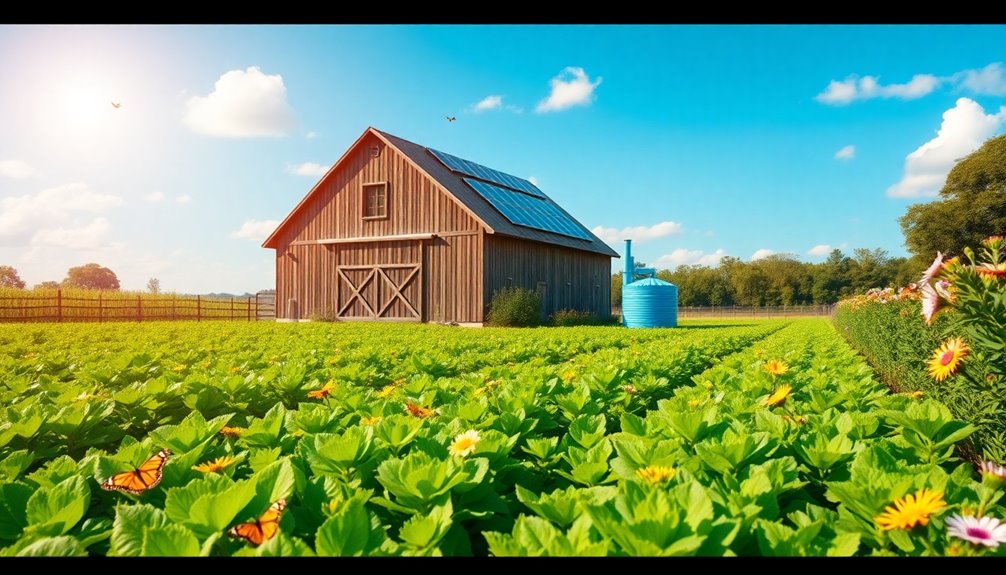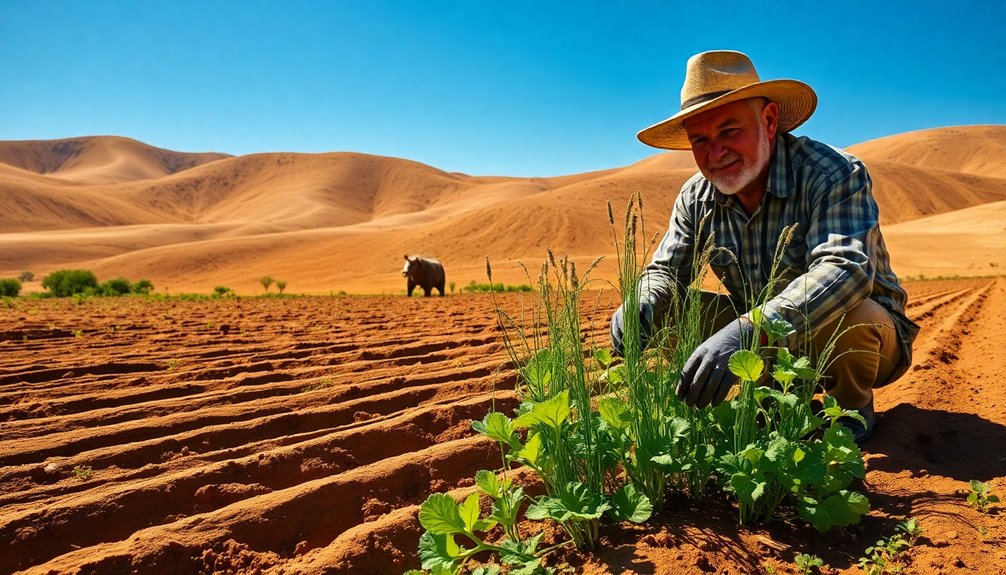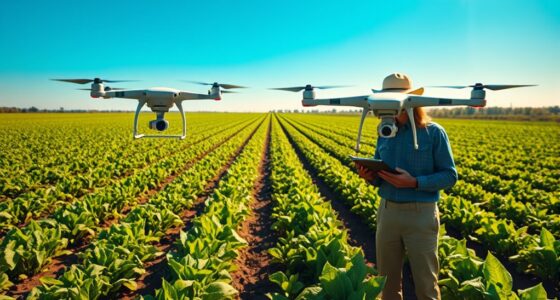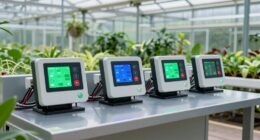Sustainable farming is all about nurturing the earth while providing food for future generations. You'll employ practices like crop rotation and cover crops to enhance soil health and reduce erosion. Innovations such as precision agriculture help you optimize resources, making your farming more efficient and eco-friendly. By adopting these methods, you not only increase your farm's resilience against climate change but also improve your community's economic well-being. This approach creates a thriving environment, supporting local farmers and promoting fair trade. If you're curious about how you can get involved in this movement, there's much more to uncover.
Key Takeaways
- Sustainable farming prioritizes soil health through practices like crop rotation and cover crops to enhance fertility and combat degradation.
- It integrates innovative techniques such as precision agriculture and AI for efficient resource use and real-time monitoring.
- Emphasizing conservation practices, sustainable farming reduces erosion and fosters biodiversity while supporting environmental responsibility among farmers.
- Community engagement and collaboration are crucial for addressing climate change and promoting intergenerational responsibility in agriculture.
- The approach boosts economic sustainability, improves market access for smallholders, and strengthens resilience for vulnerable populations.
Importance of Soil Health
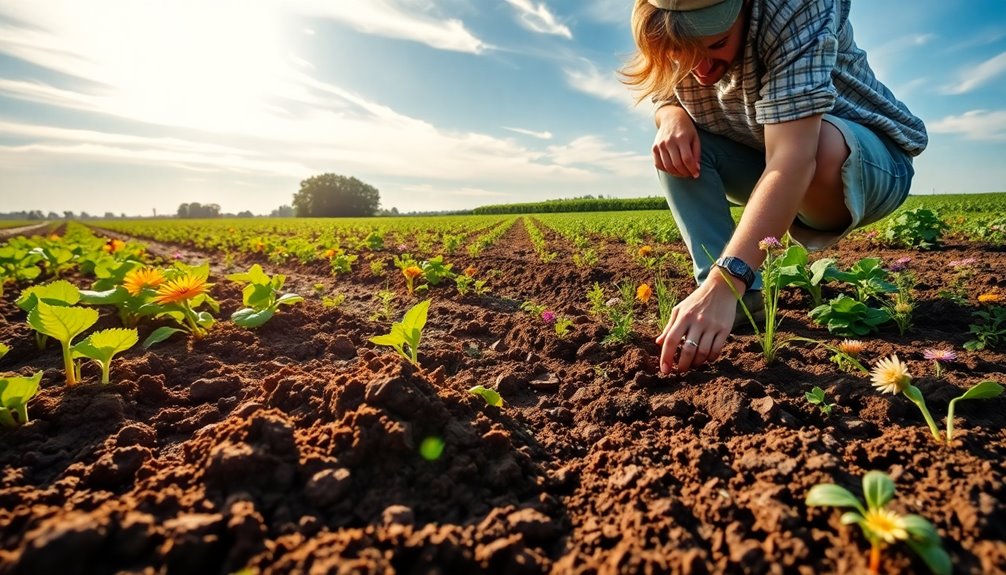
Soil health is the backbone of sustainable farming, playing an essential role in enhancing productivity and biodiversity.
When you implement sustainable farming practices like crop rotation and cover crops, you greatly improve soil fertility and water retention. Enriching your soil with organic matter not only boosts agricultural productivity but also helps combat soil degradation, ensuring your land remains viable for future generations.
Healthy soils contribute to food security, offering resilience against climate change and environmental challenges. By maintaining living roots year-round, you reduce erosion and enhance your soil's ability to retain moisture, which is vital for peak crop yields.
Prioritizing soil health means investing in a sustainable future for agriculture and your community.
Adoption of Conservation Practices
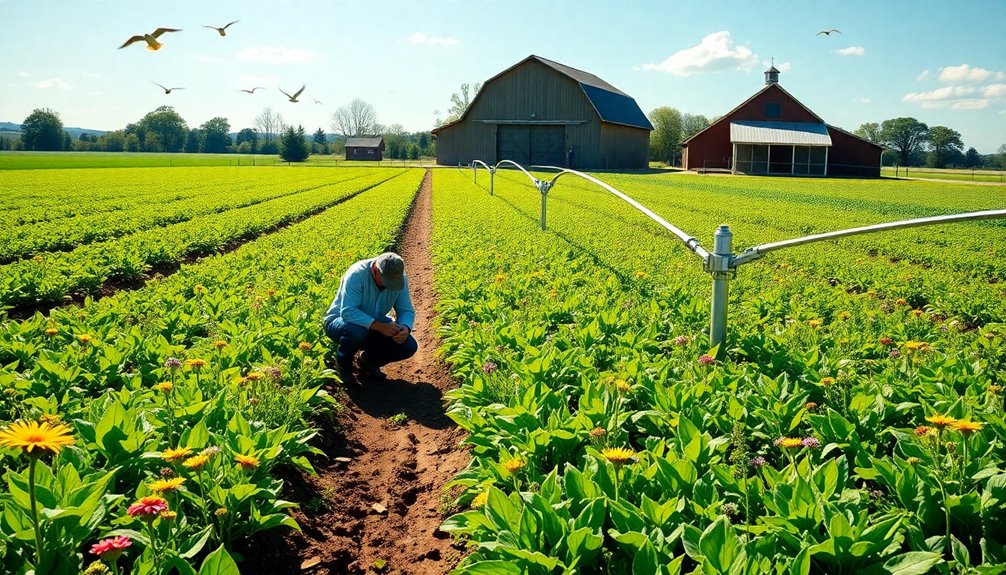
Conservation practices are increasingly becoming a cornerstone of modern agriculture, with many farmers recognizing their essential role in promoting sustainability.
By adopting sustainable practices like cover crops, you can markedly improve soil health and boost biodiversity while reducing erosion and enhancing water retention. This commitment to conservation reflects a growing environmental responsibility among farmers, echoing the stewardship values emphasized since 1864 by pioneers like Sarah Delbecq, who aimed to leave land in better condition for future generations.
Education from seed salesmen has also been fundamental, equipping you with knowledge about effective conservation techniques.
Ultimately, implementing these practices not only elevates soil liveliness but also guarantees the long-term productivity and sustainability of your farming systems.
Innovations in Farming
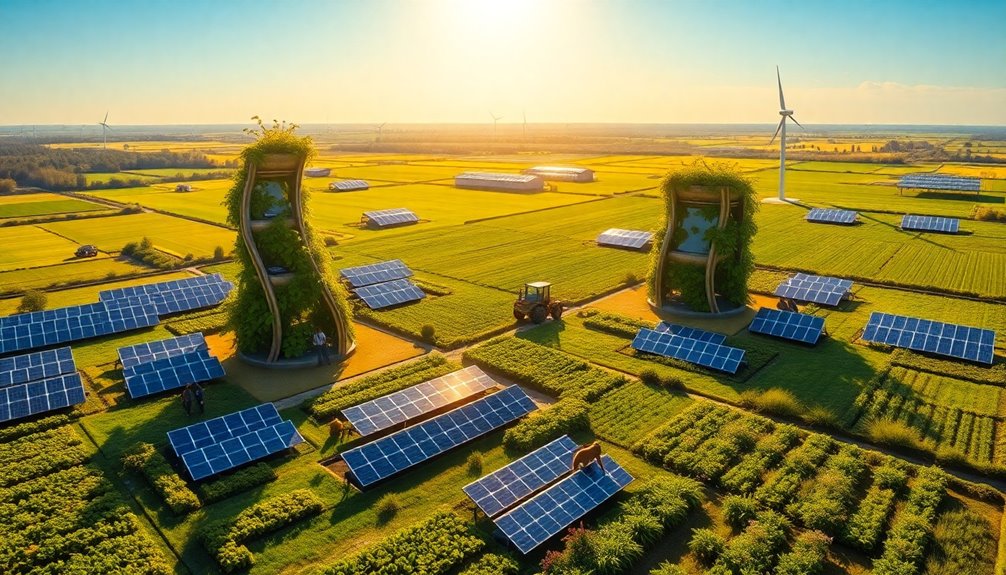
As you embrace conservation practices, it's important to also explore the latest innovations in farming that can further enhance your sustainability efforts.
Precision agriculture utilizes GPS and sensor technologies to optimize resource use, boosting productivity while reducing waste. By adopting regenerative agricultural practices, you can restore soil health and biodiversity, improving your farm's resilience against climate change.
Integrating satellite-based data lets you monitor crop health effectively, aiding in better decision-making. New technologies, like AI-driven analytics, enable real-time monitoring of environmental conditions, allowing you to adapt quickly. Additionally, utilizing energy-efficient heat pumps can play a crucial role in reducing operational energy costs on your farm.
Collaborative efforts among farmers, researchers, and agribusinesses drive continuous innovation in sustainable agriculture, ensuring food demands are met while preserving the environment for future generations.
Future of Sustainable Farming
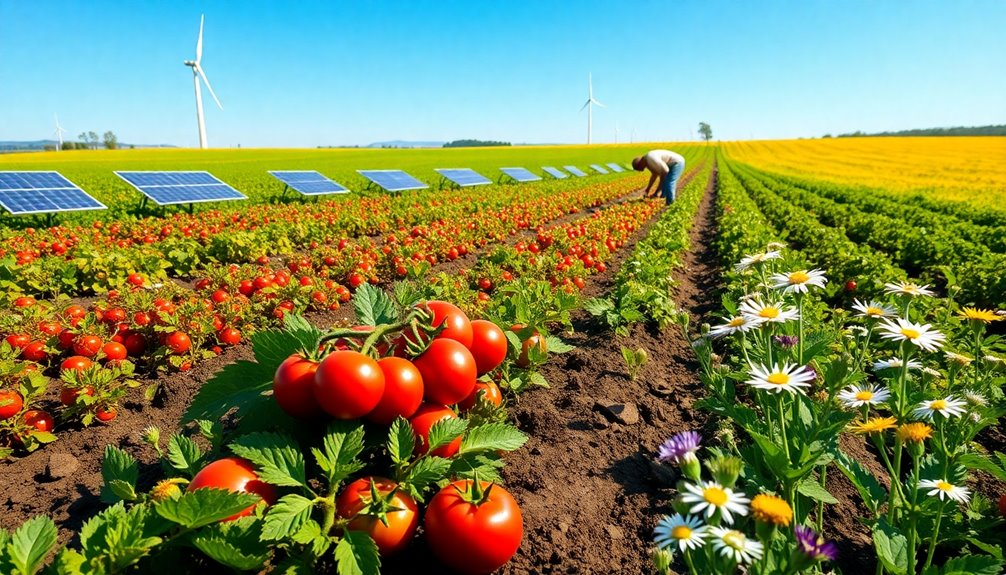
There's a growing recognition that the future of sustainable farming lies in a harmonious blend of innovation and tradition. By focusing on sustainable agriculture, you can enhance soil health and improve water management practices.
Innovations in technology, like AI-driven precision farming, will help you monitor crops more efficiently, boosting agricultural practices that support environmentally friendly food production.
Community engagement plays an essential role, fostering collaboration among farmers and consumers to tackle climate change together.
With an increasing demand for sustainably sourced food, your efforts contribute to global food security and intergenerational responsibility.
Economic and Social Impacts
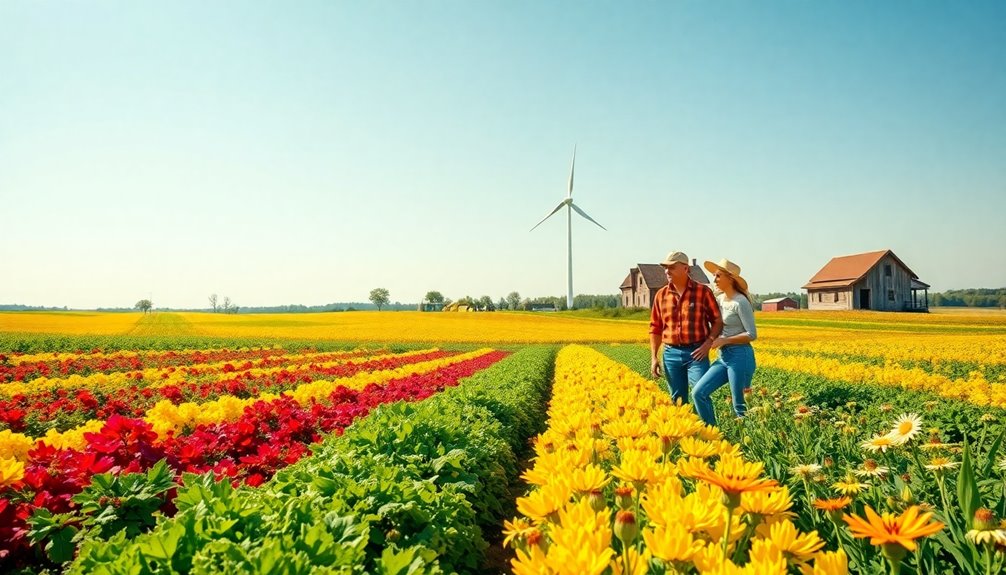
Sustainable farming isn't just about environmental benefits; it also brings significant economic and social impacts. By investing in sustainable agriculture, you enhance economic sustainability for local communities.
Practices like agroforestry can boost agricultural production and increase farm income by up to 30%. Plus, sustainable methods improve market access for smallholder farmers, promoting fair trade and increasing their income stability.
Initiatives focused on sustainable farming, such as Jiva, create job opportunities in rural areas, empowering communities with better financial tools and access to quality supplies.
These practices help strengthen community resilience, foster social equity, and improve food security by ensuring that vulnerable populations have stable access to nutritious food, ultimately addressing hunger and malnutrition.
Frequently Asked Questions
What Is the Future of Sustainable Farming?
The future of sustainable farming's looking bright for you.
You'll see innovations like precision agriculture and satellite data improving efficiency while meeting the growing demand for eco-friendly products.
As you embrace practices like cover cropping and conservation tillage, you're not just enhancing productivity; you're also contributing to environmental stewardship.
Community engagement and education are essential, too, as they strengthen local economies and promote collective efforts toward a greener, more resilient agricultural landscape.
What Is the Main Goal of Sustainable Agriculture?
Picture a world where tomorrow's meals don't come at the expense of our planet. The main goal of sustainable agriculture is to guarantee you can enjoy healthy food today while preserving resources for future generations.
It's all about maintaining soil health, water quality, and biodiversity. You're not just cultivating crops; you're nurturing the environment and supporting local communities.
Which Would Be the Best Example of Sustainable Farming?
When considering the best example of sustainable farming, you might think of organic farming. It avoids synthetic fertilizers and pesticides, relying instead on natural inputs to boost soil fertility and biodiversity.
This practice not only nurtures the environment but also promotes healthier food options for you.
Additionally, methods like cover cropping and agroforestry can complement organic practices, enhancing soil health and resilience, making them excellent choices for sustainable agriculture.
How to Contribute to Sustainable Agriculture?
You can be a superhero for the planet by contributing to sustainable agriculture!
Start by adopting practices like composting and supporting local farmers through community-supported agriculture (CSA).
Consider using precision agriculture tools to optimize resources and reduce waste.
Educate yourself and others about sustainable methods, and advocate for policies that promote eco-friendly farming.
Every small action counts, helping create a healthier ecosystem and a brighter future for food security.
Conclusion
Sustainable farming isn't just a trend; it's a necessity for our planet's future. By prioritizing soil health and adopting conservation practices, you're not only helping the environment but also boosting local economies. For instance, a small farm that switched to crop rotation and organic fertilizers saw a 30% increase in yield while reducing costs. Embracing these methods can create a greener future for agriculture, benefiting both you and the world around you. Let's grow together!

